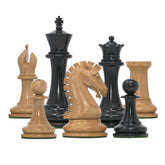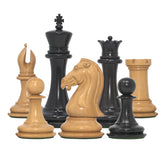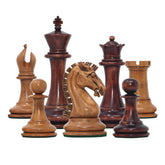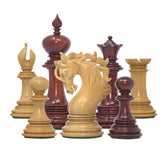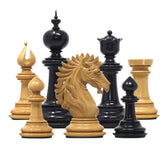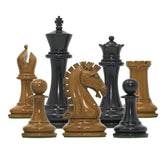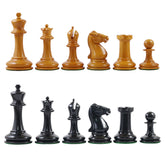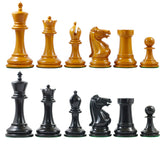How Playing Chess Can Boost Your Mental Health: A Comprehensive Guide
Playing chess can have real and lasting benefits on your mental health. Chess is a game of strategy which brings with it a certain sense of clarity, and has even been known to reduce anxiety and depression. In this comprehensive guide on how playing chess can help your mental health, find out why it's so important to take time out for yourself, and how chess can be the game-changer you need in order to feel better.
What is Chess?
Though it may seem like a simple game, chess is actually quite complex and requires strategy and planning to win. Each player has 16 pieces, which include pawns, rooks, knights, bishops, a queen, and a king. The objective of the game is to checkmate the other player’s king, meaning to put it into a position where it cannot move without being captured.
To start the game, the board is set up with each player having their pieces in specific positions. The pawns are in front of the other pieces, and the rooks are in the corners. The knight goes next to the rooks, followed by the bishops. The queen goes in her color’s corner, and finally the king is placed in between the queen and a rook.
Once everything is set up, White makes the first move. Players take turns moving one piece at a time until someone’s king is checkmated. To move a piece, you simply pick it up and place it in a new spot on the board. However, there are rules governing how each piece can move. For example, pawns can only move forward one space at a time (except for their very first move when they can choose to move two spaces), while bishops can only move diagonally.
There are also special moves that can be made under certain circumstances such as castling (moving the king two spaces towards a rook while also moving the rook to
Benefits of Playing Chess
Chess is a classic board game that has been around for centuries. The game is known for its ability to improve mental health, and recent studies have shown that playing chess can have a number of benefits for mental health.
Some of the potential benefits of playing chess include:
- Improved memory and concentration: Chess requires players to remember a large number of rules and strategies. This can help improve memory and concentration skills.
- Improved problem-solving skills: Chess also requires players to think ahead and plan their moves. This can help improve problem-solving skills.
- Improved planning and organizational skills: The game of chess requires players to plan their moves in advance and organize their pieces on the board. This can help improve planning and organizational skills.
- Increased creativity: Because chess involves thinking outside the box, it can help increase creativity levels.
- Stress relief: Chess can be a great way to relieve stress as it is a relaxing activity that requires focus and concentration.
How to Play Chess
Playing chess can be a great way to improve your mental health. Chess is a game that requires strategic thinking and planning, which can help improve your problem-solving skills. Additionally, chess can help improve your memory and concentration. And, according to some studies, playing chess can also reduce stress and anxiety levels.
So, how do you play chess? The game of chess is played on a board that consists of 64 squares (32 white squares and 32 black squares). The board is arranged in eight rows (called ranks) and eight columns (called files). Each player has 16 pieces: eight pawns, two knights, two bishops, two rooks, one queen, and one king. The objective of the game is to checkmate the opponent's king—that is, to trap the king so that it cannot move without being captured.
To start the game, each player places their pieces on the first rank of the board as follows: The king goes in the middle file; the queen goes in the file next to the king; the rooks go in the corners; and the knights and bishops go in between. Pawns are placed in front of all other pieces.
Once all the pieces are in place, White makes the first move. After that, players alternate turns. On each turn, a player must move one piece—with a few exceptions (which we'll get into later). Pieces can move only certain ways depending on their type:
Strategies in Playing Chess
There are many different strategies that can be employed while playing chess. Some of these may be more effective than others, depending on the individual and the situation. However, some general tips on how to approach the game can be useful for all players.
First and foremost, it is important to take your time while playing chess. This is a game of strategy and planning, and rushing into moves will likely lead to mistakes. It is better to take a few moments to consider each move and its implications before making your decision.
Another important strategy is to try to anticipate your opponent's moves. This can be difficult, but if you can guess correctly even a few times, it can give you a significant advantage. Pay attention to their previous moves and what they might be trying to accomplish, and use this information to predict their next steps.
When it comes to making your own moves, always try to think ahead. Consider not only what your current move will do, but also how it will impact future turns. For instance, sacrificing a piece may help you win in the short-term, but if it leaves you vulnerable later on then it may not be worth it in the long run. Planning several steps ahead can give you a big advantage over your opponent.
Of course, these are just general tips and there is no guarantee that they will work in every situation. However, taking the time to think about your moves and planning ahead can definitely give you an edge in chess
The Psychological Impact of Playing Chess

Chess is not only a game of strategy and logic, but it also has a deep psychological impact on those who play it. The game can produce feelings of elation and satisfaction, as well as frustration and anger. It can also help people develop important life skills, such as patience, critical thinking, and planning ahead.
Chess has been shown to improve mental health in a variety of ways. For example, the game can help reduce stress levels and anxiety, while also improving memory and concentration. Additionally, chess can help boost self-esteem and confidence, as well as provide an outlet for creative expression.
Whether you’re a beginner or a seasoned player, chess can have a positive impact on your mental health. So don’t be afraid to give the game a try!
Health Risks Associated with Too Much Chess Playing
There are a few health risks associated with playing chess too much. They are:
- Repetitive stress injuries: Like any activity that involves repetitive motions, playing chess can lead to repetitive stress injuries. The most common of these is carpal tunnel syndrome, which can cause numbness, tingling, and pain in the hands and wrists.
- Eye strain: Staring at a chess board for long periods of time can cause eye strain. This can lead to headaches, blurry vision, and dry eyes.
- Back pain: Sitting in one position for a long time can cause back pain.
- Neck pain: Looking down at a chess board for long periods of time can cause neck pain and stiffness.
While these risks are real, they are all relatively minor compared to the benefits of playing chess. And, they can all be avoided by taking some simple precautions:
- Take breaks often: To avoid repetitive stress injuries, take breaks every 20 minutes or so to stretch and give your muscles a break.
- Use good lighting: Make sure the room you're playing in is well-lit to avoid eye strain.
- Sit up straight: Sit up straight to avoid back pain while playing chess.
Tips on Enjoying the Benefits of Chess While Staying Safe
In order to enjoy the benefits of chess while staying safe, it is important to follow a few simple tips. First, be sure to choose a reputable chess set and board that meets your needs and budget. There are many different types and brands of chess sets available, so it is important to do your research before making a purchase.
Second, make sure you understand the rules of the game before playing. Chess is a complex game with many different strategies and tactics, so it is important to learn as much as you can before jumping into a game. There are plenty of resources available online and in libraries that can help you learn the basics of the game.
Third, always play against an opponent who is at or below your skill level. Playing against someone who is too skilled can be frustrating and overwhelming, while playing against someone who is not skilled enough can be boring and unenjoyable. By finding an opponent who is at your skill level, you will be able to improve your own skills while still enjoying the game.
Finally, take breaks when needed. Chess can be mentally taxing, so it is important to take breaks throughout the game in order to stay fresh. If you start feeling overwhelmed or frustrated, take a break for a few minutes to clear your head before jumping back into the game.
Conclusion
Chess is a great way to improve your mental health, as it can help to improve problem-solving skills, memory, and creativity. It can also provide an enjoyable distraction from daily life while still allowing you to stay mentally active. Plus, the social benefits of playing chess with friends or family are invaluable. Whether you’re new to the game or already a seasoned player, playing chess can be a great way to boost your mental health and wellbeing– why not give it a try?
For more such interesting articles visit at www.stauntoncastle.com/blogs/news
Order Luxury Chess Sets and Pieces Here - www.stauntoncastle.com
Sample Block Quote
Sample Paragraph Text
- beginner to pro in chess game
- benefit of playing chess
- benefits of chess game
- Best 10 Chess Opening Books
- best benefit of chess game
- Best Chess Opening Books
- buy chess pieces
- buy chess set
- chess Grandmaster
- chess history
- chess meme
- Everything About Chess Movies & Chess Streams
- Grandmaster
- History of chess
- luxury chess sets
- Magnus Carlsen
- online chess
- Playing Chess Can Boost Your Mental Health
